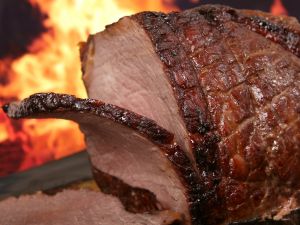 In English, we have different names for animals and their meat. For example, a cow is still a cow when it’s alive but when it’s been killed and is ready to eat, we call it ‘beef’. The same for ‘pig’ and ‘pork’, ‘sheep’ and ‘mutton’, ‘deer’ and ‘venison’, and so on.
In English, we have different names for animals and their meat. For example, a cow is still a cow when it’s alive but when it’s been killed and is ready to eat, we call it ‘beef’. The same for ‘pig’ and ‘pork’, ‘sheep’ and ‘mutton’, ‘deer’ and ‘venison’, and so on.
The reason for this comes from a long time in the past when most of England was ruled by French-speaking lords and noblemen.
The peasants working in the fields spoke old English but the lords in their castles and their chefs spoke French. So, in the field, an animal had an English name but once it got to the kitchen, the French name was used.
Over time, the expertise of the French-speaking chefs was passed on to regular people and the words for ingredients came with it. The words changed a little but if you look carefully, you can still see their relation to the French words.
- beef – Old French: boef (ox)
- pork – Old French: porc, from latin: porcus (pig)
- venison – Old French: venaison (meat of large game)
- mutton – Old French: mouton
So that’s why we have different words for animals and their meat in English.
Today’s image is by Rob Owen-Wahl.